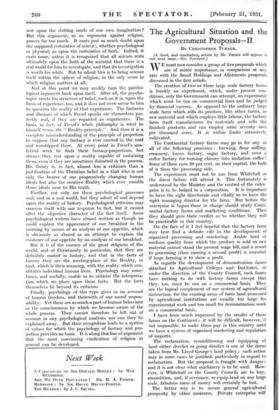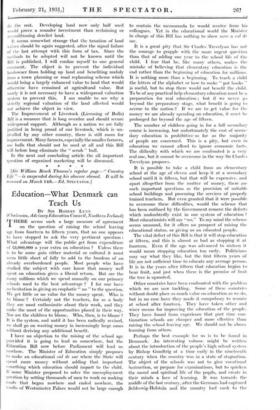The Agricultural Situation and the Government Proposals—II
BY CHRISTOPHER TURNOR.
[A third, and concluding, article by Mr. Turner will appear in our next issue.—En. Spectator.] E must now consider a group of five proposals which are of minor importance, in comparison at any rate with the Small Holdings and Allotments proposals discussed in the first article.
The creation of two or three large scale factory farms is frankly an experiment, which, under present con- ditions, only the Government can attempt, an experiment which must be run on commercial lines and be judged by financial success. As opposed to the ordinary large scale farm which sells its produce, like other farms, as raw material and which employs little labour, the factory farm itself manufactures its materials and sells the finished products and can employ some seventy men per thousand acres. It is within limits intensively cultivated.
The Continental factory farms may go in for any or all of the following processes : brewing, flour milling, creamery, bacon factory, sugar factory, and even a coffee factory for turning chicory into imitation coffee ! Some of them earn 20 per cent. on their capital, the bulk of it from the processing side.
The experiment must not be run from Whitehall or the direst failure will attend it. This fortunately is understood by the Ministry and the control of the enter- prise is to be lodged in a corporation. It is important to have the right directorate and vitally so to haVe the right managing director for the farm. But before the enterprise is begun those in charge should study Conti- nental factory farms and marketing conditions. Then they should give their verdict as to whether they will be practicable in this country.
On the face of it I feel hopeful that the factory farm may here find a definite role in the development of organized processing and marketing. Arable land of medium quality from which the produce is sold as raw material cannot stand the present wage bill, and a resort to processing (thus earning a second profit) is essential if large farming is to show a profit.
As regards the development of demonstration farms attached to Agricultural Colleges and Institutes, or under the direction of the County Council, such farms have nothing to do with factory farms except that they, too, must be run on a commercial basis. They are the logical complement of our system of agricultural instruction, for the existing areas of farm land possessed by agricultural institutions are usually too large for experimental work and too small for demonstration work on a commercial basis.
I have been much impressed by the results of these farms on the Continent ; it will be difficult, however, if not impossible, to make them pay in this country until we have a system of organized marketing and regulation of imports.
The reclamation, reconditioning and equipping of land either derelict or going derelict is one of the items taken from Mr. Lloyd George's land policy ; such action may in some cases be justified, particularly in regard to reclamation. But the proposal is fraught with danger ; and it is not clear what machinery is to be used. How- ever, if Whitehall or the County Councils are to buy, recondition, and, if necessary, re-equip land on any large scale, fabulous sums of money will certainly be lost.
The better way is to secure general agricultural prosperity by other measures. Private enterprise will do the rest. Developing land now only half used, would prove a sounder investment than reclaiming -or. reconditioning derelict land.
It seems somewhat strange that the taxation of land values should be again suggested, after the signal failure of the last attempt with this form of tax. Since the methods to be adopted will not be known until the Bill is published, I will confine myself to one general comment. The object is to prevent, the individual landowner from holding up land and benefiting unduly from a town planning or road replanning scheme which would bring a largely enhanced value to land that would otherwise have remained at agricultural value. But surely it is not necessary to have a widespread valuation system to prevent this. I am unable to see why a strictly . regional valuation of the land affected would not achieve the object in view.
The Improvement of Livestock (Licensing of Bulls) Bill is a measure that is long overdue and should secure widespread support. Although as a nation we arc fully justified in being proud of our livestock, which is un-. rivalled by any other country, there is still room for improvement. Many farmers, especially the smaller farmers, use bulls that should not be used at all and this Bill will before long eliminate the " scrub '7 bull.
In the next and concluding article the all important question of organized marketing will, be discussed.
* * * .
[Sir William Beach Thomas's regular page—" Country Life "—is suspended during his absence abroad. It will be resumed on March 14th.rEd. SPECTATOR.] .












































 Previous page
Previous page